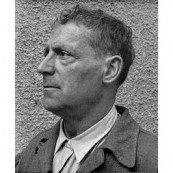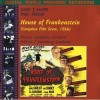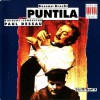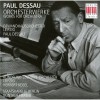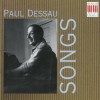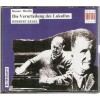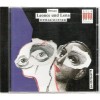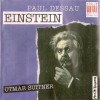Composers
Paul Dessau (19 December 1894 – 28 June 1979) was a German composer and conductor.
Dessau was born in Hamburg into a musical family. His grandfather, Moses Berend Dessau, was a cantor, his uncle, Professor Bernhard Dessau, Konzertmeister (English: leader, lead violinist, or concertmaster) at the Royal Opera House, Unter den Linden, his cousin Max Winterfeld became generally known under the name Jean Gilbert as a composer of operettas and his second cousin, Robert Gerson Muller-Hartmann, was a composer and collaborator with Vaughan Williams.[citation needed]
From 1909 he majored in violin at the Klindworth-Scharwenka Conservatory in Berlin. In 1912 he became répétiteur at the City Theatre (Stadttheater) in Hamburg. There he studied the work of the conductors Felix Weingartner and Arthur Nikisch and took classes in composition from Max Julius Loewengard. He was second Kapellmeister at the Tivoli Theatre in Bremen in 1914 before being drafted for military service in 1915.[citation needed]
After World War I he became conductor at the Intimate Theatre (Kammerspiele), Hamburg, and was répétiteur and later Kapellmeister at the opera house in Cologne under Otto Klemperer between 1919 and 1923. In 1923 he became Kapellmeister in Mainz and from 1925 Principal Kapellmeister at the Städtische Oper Berlin under Bruno Walter.[citation needed]
In 1933 Dessau emigrated to France, and 1939 moved further to the United States, where initially he lived in New York before moving to Hollywood. Dessau returned to Germany with his second wife, the writer Elisabeth Hauptmann, and settled in East Berlin in 1948.
Starting in 1952 he taught at the Public Drama School (Staatliche Schauspielschule) in Berlin-Oberschöneweide where he was appointed to a professorship in 1959. He became a member of the Deutsche Akademie der Künste Berlin in 1952 and was vice-president of this institution between 1957 and 1962. He taught many master classes, his pupils including Friedrich Goldmann, Reiner Bredemeyer, Jörg Herchet, Hans-Karsten Raecke, Friedrich Schenker, Luca Lombardi and Karl Ottomar Treibmann.[citation needed]
From 1954 he was married to the choreographer and director Ruth Berghaus. Their son Maxim Dessau (b. 1954) is a film director.
Dessau died on 28 June 1979 at the age of 84, in the then East German city of Königs Wusterhausen, on the outskirts of Berlin.
Dessau composed operas, scenic plays, incidental music, ballets, symphonies and other works for orchestra, and pieces for solo instruments as well as vocal music. Since the 1920s he had been fascinated by film music. Among others he wrote compositions for early movies of Walt Disney, background music for silent pictures and early German films. While in exile in Paris he wrote the oratorio Hagadah shel Pessach after a libretto by Max Brod. In the 1950s in collaboration with Bertolt Brecht he focussed on the musical theatre. During that time his operas were produced. He also wrote Gebrauchsmusik (utility music) for the propaganda of the German Democratic Republic. At the same time he lobbied for the musical avant-garde (e.g. Witold Lutosławski, Alfred Schnittke, Boris Blacher, Hans Werner Henze and Luigi Nono).
Recently Added
Biography
Paul Dessau (19 December 1894 – 28 June 1979) was a German composer and conductor.
Dessau was born in Hamburg into a musical family. His grandfather, Moses Berend Dessau, was a cantor, his uncle, Professor Bernhard Dessau, Konzertmeister (English: leader, lead violinist, or concertmaster) at the Royal Opera House, Unter den Linden, his cousin Max Winterfeld became generally known under the name Jean Gilbert as a composer of operettas and his second cousin, Robert Gerson Muller-Hartmann, was a composer and collaborator with Vaughan Williams.[citation needed]
From 1909 he majored in violin at the Klindworth-Scharwenka Conservatory in Berlin. In 1912 he became répétiteur at the City Theatre (Stadttheater) in Hamburg. There he studied the work of the conductors Felix Weingartner and Arthur Nikisch and took classes in composition from Max Julius Loewengard. He was second Kapellmeister at the Tivoli Theatre in Bremen in 1914 before being drafted for military service in 1915.[citation needed]
After World War I he became conductor at the Intimate Theatre (Kammerspiele), Hamburg, and was répétiteur and later Kapellmeister at the opera house in Cologne under Otto Klemperer between 1919 and 1923. In 1923 he became Kapellmeister in Mainz and from 1925 Principal Kapellmeister at the Städtische Oper Berlin under Bruno Walter.[citation needed]
In 1933 Dessau emigrated to France, and 1939 moved further to the United States, where initially he lived in New York before moving to Hollywood. Dessau returned to Germany with his second wife, the writer Elisabeth Hauptmann, and settled in East Berlin in 1948.
Starting in 1952 he taught at the Public Drama School (Staatliche Schauspielschule) in Berlin-Oberschöneweide where he was appointed to a professorship in 1959. He became a member of the Deutsche Akademie der Künste Berlin in 1952 and was vice-president of this institution between 1957 and 1962. He taught many master classes, his pupils including Friedrich Goldmann, Reiner Bredemeyer, Jörg Herchet, Hans-Karsten Raecke, Friedrich Schenker, Luca Lombardi and Karl Ottomar Treibmann.[citation needed]
From 1954 he was married to the choreographer and director Ruth Berghaus. Their son Maxim Dessau (b. 1954) is a film director.
Dessau died on 28 June 1979 at the age of 84, in the then East German city of Königs Wusterhausen, on the outskirts of Berlin.
Dessau composed operas, scenic plays, incidental music, ballets, symphonies and other works for orchestra, and pieces for solo instruments as well as vocal music. Since the 1920s he had been fascinated by film music. Among others he wrote compositions for early movies of Walt Disney, background music for silent pictures and early German films. While in exile in Paris he wrote the oratorio Hagadah shel Pessach after a libretto by Max Brod. In the 1950s in collaboration with Bertolt Brecht he focussed on the musical theatre. During that time his operas were produced. He also wrote Gebrauchsmusik (utility music) for the propaganda of the German Democratic Republic. At the same time he lobbied for the musical avant-garde (e.g. Witold Lutosławski, Alfred Schnittke, Boris Blacher, Hans Werner Henze and Luigi Nono).
